Nad and fadh2 - Study guides, Class notes & Summaries
Looking for the best study guides, study notes and summaries about Nad and fadh2? On this page you'll find 569 study documents about Nad and fadh2.
Page 3 out of 569 results
Sort by
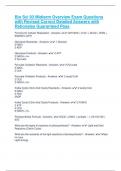
-
Bio Sci 93 Midterm Overview Exam Questions with Revised Correct Detailed Answers with Rationales Guaranteed Pass
- Exam (elaborations) • 13 pages • 2024
- Available in package deal
-
- $16.99
- + learn more
Bio Sci 93 Midterm Overview Exam Questions with Revised Correct Detailed Answers with Rationales Guaranteed Pass Formula for Cellular Respiration - Answers - C6H12O6 + 6 O2 -> 6CO2 + 6H20 + ENERGY (ATP) Glycolysis Reactants - Answers - 1 Glucose 2 NAD+ 2 ADP Glycolysis Products - Answers - 2 ATP 2 NADH + H+ 2 Pyruvate Pyruvate Oxidation Reactants - Answers - 2 Pyruvate 2 NAD+ 2 CoA Pyruvate Oxidation Products - Answers - 2 acetyl CoA 2 CO2 2 NADH + H+ Krebs Cycle (Ci...
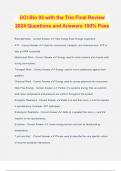
-
UCI Bio 93 with the Trio Final Review 2024 Questions and Answers 100% Pass
- Exam (elaborations) • 26 pages • 2024
-
- $13.49
- + learn more
UCI Bio 93 with the Trio Final Review 2024 Questions and Answers 100% Pass Bioengernetics - Correct Answer ️️ -How energy flows through organisms. ATP - Correct Answer ️️ -Used for mechanical, transport, and chemical work. ATP is also an RNA nucleotide. Mechanical Work - Correct Answer ️️ -Energy used in motor proteins and muscle cells during contractions. Transport Work - Correct Answer ️️ -Energy used to move substances against their gradient. Chemical Work - Correct A...
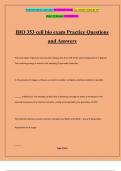
-
BIO 353 cell bio exam Practice Questions and Answers
- Exam (elaborations) • 110 pages • 2024
-
- $13.49
- + learn more
BIO 353 cell bio exam Practice Questions and Answers The break down of glucose into pyruvate releases less than 25% of the total energy present in glucose. The remaining energy is stored in the resulting (2) pyruvate molecules. In the presence of oxygen, acting as an electron acceptor, complete substrate oxidation is possible. ______ is defined as "the oxidation driven flow of electrons, through or within a membrane, from reduced coenzymes to an electron acceptor, usually accompanied by...
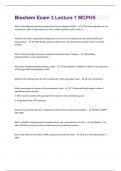
-
Biochem Exam 3 Lecture 1 MCPHS Questions With Answers Graded A+ Assured Success
- Exam (elaborations) • 4 pages • 2024
- Available in package deal
-
- $7.99
- + learn more
What is the difference between ubiquinone (Q) and ubiquinol (QH2) - Q is fully oxidized so it has no electrons, QH2 is fully reduced so it has 2 more electrons and H+ than Q What are the other sequentially acting electron carriers in the respiratory chain besides NAD and flavoproteins - Hydrophobic quinone (ubiquinone, Q), Cytochrome (contain iron), Iron-sulfur proteins What is the final stage of cellular respiration and where does it happen - Oxidative phosphorylation, in the mitochondria...
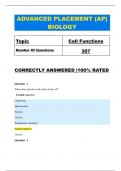
-
ADVANCED PLACEMENT (AP) BIOLOGY Cell Functions 307 QUESTIONS CORRECTLY ANSWERED |100% RATED
- Exam (elaborations) • 132 pages • 2023
- Available in package deal
-
- $10.00
- + learn more
Questions 1 Where does glycolysis take place in the cell? Possible Answers: Golgi body Mitochondria Nucleus Cytosol Endoplasmic reticulum Correct answer: Cytosol Questions 2 Which of the following reflects a function of fermentation? Possible Answers: It produes two molecules of ATP It leads to the production of lactic acid in yeast cells It leads to the production of ethanol in muscle cells It oxidizes NADH to NAD+ Correct answer: It oxidizes NADH to NAD+ Questions 3 ...
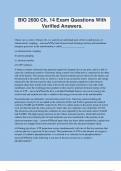
-
BIO 2600 Ch. 14 Exam Questions With Verified Answers
- Exam (elaborations) • 25 pages • 2024
-
- $12.49
- + learn more
BIO 2600 Ch. 14 Exam Questions With Verified Answers. Choice (a) is correct. Choices (b), (c), and (d) are individual parts of the overall process of chemiosmotic coupling. - answerThe link between bond-forming reactions and membrane transport processes in the mitochondria is called __________________. (a) chemiosmotic coupling. (b) proton pumping. (c) electron transfer. (d) ATP synthesis. A battery contains chemicals that generate negatively charged ions at one pole, and it is able to ...
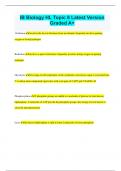
-
IB Biology HL Topic 8 Latest Version Graded A+
- Exam (elaborations) • 6 pages • 2024
- Available in package deal
-
- $8.99
- + learn more
IB Biology HL Topic 8 Latest Version Graded A+ Oxidation involves the loss of electrons from an element; frequently involves gaining oxygen or losing hydrogen Reduction involves a gain of electrons; frequently involves losing oxygen or gaining hydrogen Glycolysis first stage of cell respiration; in the cytoplasm, one hexose sugar is converted into 2 3-carbon atom compounds (pyruvate) with a net gain of 2 ATP and 2 NADH + H Phosphorylation 2 phosphate groups are added to a molec...
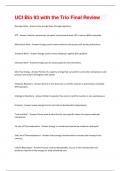
-
UCI Bio 93 with the Trio Final Review Questions With 100% Correct Solutions.
- Exam (elaborations) • 23 pages • 2024
- Available in package deal
-
- $7.99
- + learn more
Bioengernetics - Answer-How energy flows through organisms. ATP - Answer-Used for mechanical, transport, and chemical work. ATP is also an RNA nucleotide. Mechanical Work - Answer-Energy used in motor proteins and muscle cells during contractions. Transport Work - Answer-Energy used to move substances against their gradient. Chemical Work - Answer-Energy used to convey polymers into monomers. Gibs Free Energy - Answer-Portion of a systems energy that can preform work when temperature and p...

-
Bio 206 Exam 1 Study Guide Questions and Answers Graded A 2024
- Exam (elaborations) • 9 pages • 2024
-
- $13.49
- + learn more
Steps of Feedback Loop - Stimulus Sensor (afferent pathway) Integrating Center (efferent pathway) Effector Response isocitrate dehydrogenase - rate limiting enzyme in krebs cycle (citric acid cycle) Phosphofructokinase - rate limiting enzyme in glycolysis cytochrome oxidase - rate limiting enzyme in Electron Transport System Kinase - transfer of a phosphate Primary substrate glycolysis - glucose Isomerase - rearrangement of atoms glyceraldehyde 3-phosphate (GAP) - The ...
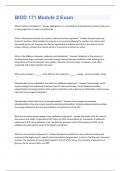
-
BIOD 171 Module 2 Exam Questions & Answers Rated 100% Correct!!
- Exam (elaborations) • 10 pages • 2024
- Available in package deal
-
- $7.99
- + learn more
What is cellular metabolism? - Answer-Metabolism is a controlled set of biochemical reactions that occur in living organisms in order to maintain life What is the primary function of enzymes, and how are they regulated? - Answer-Enzymes speed up chemical reactions. Most notably, the enzyme is not consumed during the reaction and can be used repeatedly by the cell. Enzymes can also be regulated by a cofactor such that in the absence of the proper cofactor, enzymes are inactive while in its p...

$6.50 for your textbook summary multiplied by 100 fellow students... Do the math: that's a lot of money! Don't be a thief of your own wallet and start uploading yours now. Discover all about earning on Stuvia


